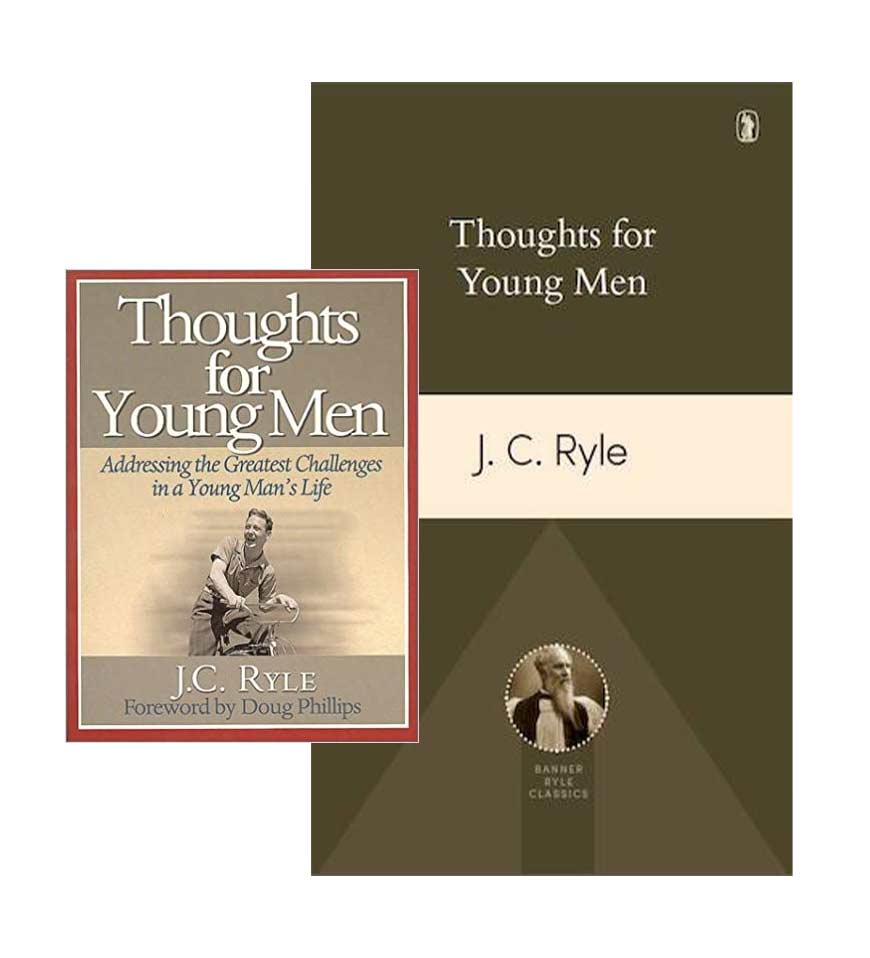Old age may have become a mark of dishonor in the world, but it should never be so in the church. Older saints normally make wiser saints, and wisdom is something my younger generation desperately needs. Bishop J. C. Ryle (1816–1900), in his little book Thoughts for Young Men, sits down with us and bids us to listen to an old man. And although Ryle is a very senior saint now, his exhortations to young men are as relevant today as they were when he wrote over 100 years ago.

I see [Ryle] as a single-minded Christian communicator of profound biblical, theological, and practical wisdom, a man and minister of giant personal stature and electric force of utterance that sympathetic readers still feel…Ryle is magnificent! There’s no other word for it. Do yourself a favor and read this wonderful book, and think about what you read.’ — J. I. PACKER
‘Thoughts For Young Men abounds in reliable counsel and says — with a rare combination of seriousness and graciousness — the very things we need to hear. Young men, for whom it was written, will find it invaluable; but all Christians, men or women, young or old, can read it with lasting benefit. It deserves to be widely read and circulated, and will do spiritual good to every reader.’ — SINCLAIR B. FERGUSON
This shouldn’t be surprising. After all, human nature doesn’t change. Young men of today, despite outward appearances, aren’t all that different from the young men of Ryle’s day. We’re prone to levity, pride of life, and general thoughtlessness. Thinking ourselves to be wise, we haven’t the slightest clue how foolish we are. Extrapolating on Paul’s exhortation for Titus to “be sober-minded,” Ryle offers what I think are three key pieces of advice to young men of all eras.
1. See the bitterness of sin.
One of the main themes Ryle clearly wanted to impress on the hearts of his young audience was the absolute bitterness of sin. He speaks as one who knows his own heart—how it clamors for the praise of man, longs for things contrary for Scripture, and disorders his affections. Ryle offers a doctrine of sin more comprehensive than what most of evangelicalism offers today. He wants to cultivate a distaste for sin for sin’s sake, so you won’t find Ryle making the excuse that he is “broken” as a way to explain away the sting of sin. Though he never once betrays the rock-solid status that justified sinners have before God, neither does he belittle the heinous nature of sin against the God who justifies. He wants the reality of sin to wound us a little, to still sting.
Yet Ryle does all of this in love. Young men, he says, are more vulnerable to particular sins. Pride, for example, is prevalent in younger men. Ryle says, “Two things are said to be very rare sights in the world—one is a young man humble, and the other is an old man content” (22). So often, we young men labor under the delusion of our own strength. My heart in particular, though humbled by the gospel, is still so very haughty.
This is why young men like me need the local church. I need elders and a congregation to subject myself to. Submitting to rightful authority helps sever the root of pride in the young Christian’s heart. Ryle never explicitly makes this application but he does exhort his audience not to forsake participating in a local church because the local church is one of the main means to bring humility to young men.
Sinning always leads to sorrowing. Ryle says sin “destroys the soul’s peace,” “breaks down its strength,” and “makes it a slave.” Ryle wants young men to grow in holiness so they will grow in their joy in God. Sin stands in the way of the only true and lasting satisfaction. Sin is bitter but Christ is sweet, which brings me to Ryle’s second piece of advice.
“Young men/women, I beseech you earnestly, beware of pride. Two things are said to be very rare sights in the world – one is a young man/woman that is humble, and the other is an old man that is content.”
2. Savor the sweetness of Christ.
Thoughts for Young Men has a somber tone, but it’s not at all lacking in gospel hope. Ryle tells his audience to fly to Christ: “Until you know this, my warnings and advice will be useless, and your endeavors, whatever they may be will be in vain. A watch without a mainspring is not more unserviceable than is a religion without Christ” (40). The point of forsaking the killjoys of sin is to rest in all that God is for us in Christ. “If you would be happy,” Ryle sweetly entreats, simply savor the gospel of the glory of Christ (2 Cor. 4:4).
Holiness is impossible apart from the power of the gospel. That’s why all the sharp imperatives Ryle gives are firmly rooted in the finished work of Christ and the power of the Spirit. “To live on Christ—to draw all from Christ, to do all in the strength of Christ, to be ever looking unto Christ—this is the true secret of spiritual prosperity” (41). Thoughts for Young Men is a call for young men to repent and believe the gospel, not to take up the latest moral improvement plan. Ryle is very interested in improved morals, but only those that come from a heart that trusts in Christ alone to save and satisfy.
3. Live in light of eternity.
Finally, Ryle wants us young men to live our whole lives in light of these first two truths. Because sin is bitter and Christ is sweet, Ryle beckons all young men to consider eternity. “Death and judgment are before young men, even as others,” he writes. We should seek to cultivate a sense that our lives on earth really are a mist (Jas. 4:4). Looking into the face of forever should sober us up.
We’re not so far from death that we have the privilege of putting off its consideration until later. The fact remains: we’ll all die and stand before the Judge of the entire universe. This should affect two different groups of people in two different ways.
First, for those who have yet to come to Christ, living in light of eternity means feeling the urgency of the gospel. Sin tells the unrepentant sinner he has time to deal with God later so he can live it up while he is young. But Ryle begs his audience not to delay. Tomorrow, he says, “is the Devil’s day.” Echoing the author of Hebrews, Ryle implores young men to fly to the provision of God in Christ as long as it is called “today”—because “tomorrow” may never come.
Second, for the Christian, the “day-spring is at hand,” which means we’re inching ever closer to our eternity with God. How incongruous is it to dally with sin when we have Christ? Once we see the weight of glory prepared for us in heaven, our soul’s affections should be purified even now.
Ryle would have us prepare for eternity, even as young men. Holiness and happiness are the lot of the saints now asleep. This same is ours now even though now we see it through a dark glass. But one day we’ll see him face-to-face. This, Ryle explains, should propel us to real, sober joy.
CONCLUSION
Thoughts for Young Men is a worthwhile read not only for young men, but anyone who needs to be exhorted to forsake the folly of sin and find their good in God. After reading, it’s hard not to feel deeply that sin is vain, unfulfilling, and utterly stupid. But that’s not all! Ryle leaves the reader with a Christ who is sufficient to cover all our sin and bring us to the living God.
On the last page of the book, Ryle writes, “The path of the worldly man grows darker and darker every year that he lives; the path of the Christian is as a shining light, brighter and brighter to the very end.” We all stand on the brink of eternity—either eternal joy or eternal misery. May our churches be filled with people (especially young men) who feel deeply this sweet and awful urgency.
Reviewed by Colton Corter
Buy printed edition on Banner of Truth



